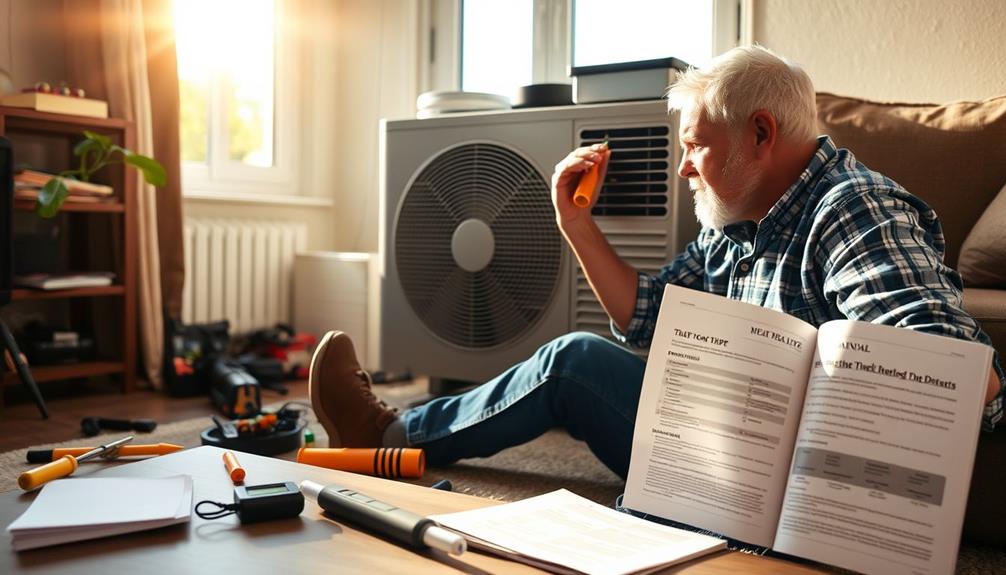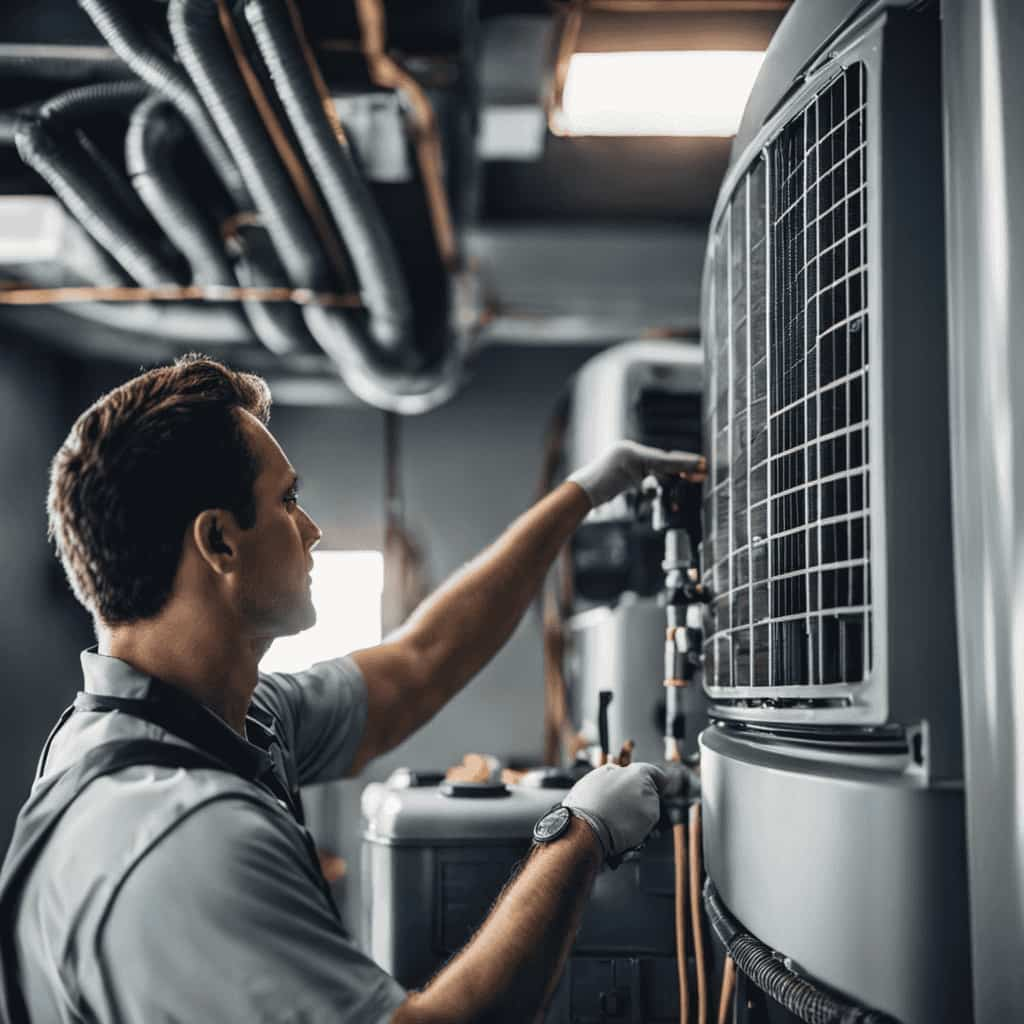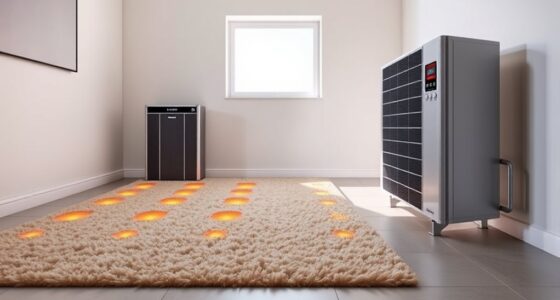We have discovered the solution to eco-friendly home heating: the innovative heat pump. Say goodbye to rising energy expenses and embrace a efficient, environmentally conscious option.
In this article, we’ll explore the benefits of heat pumps, the different types available, and what to consider when choosing one for your home.
We’ll also provide installation and maintenance tips, compare heat pumps to traditional systems, and showcase successful case studies.
Get ready to revolutionize your home heating and embrace a greener future.
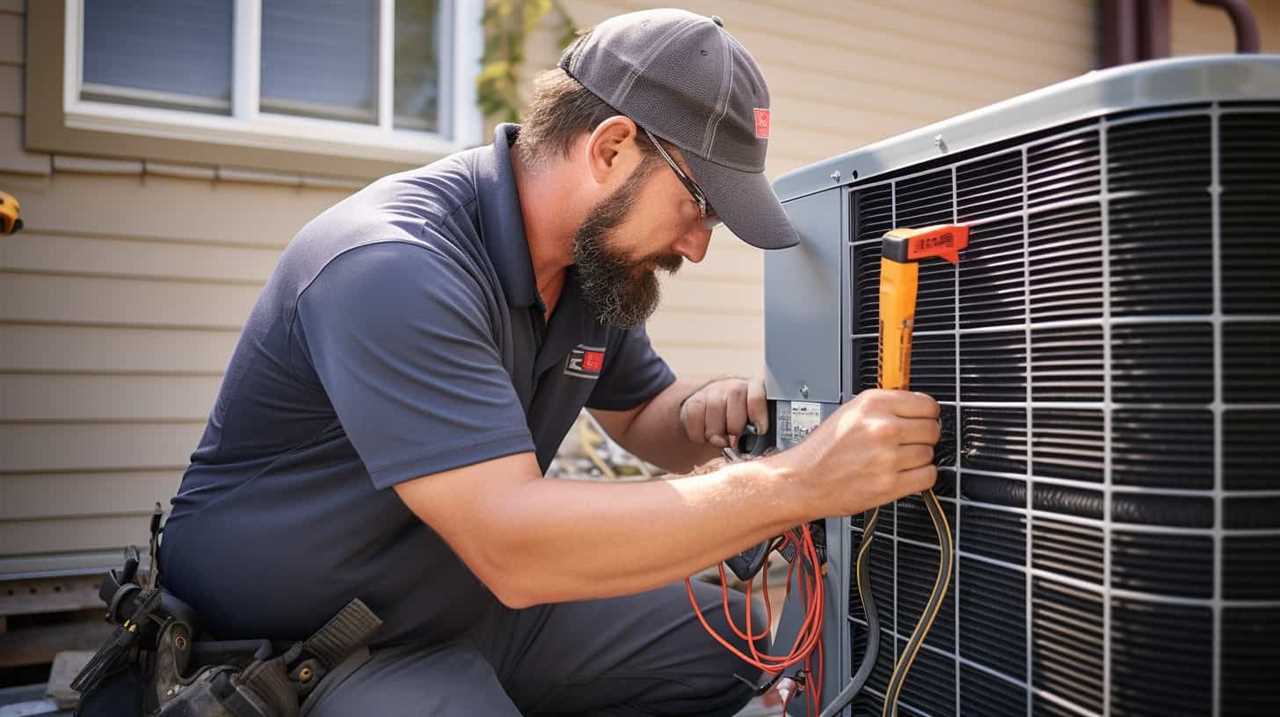
Key Takeaways
- Heat pumps use 25-50% less electricity compared to traditional heating systems.
- They reduce greenhouse gas emissions, contributing to a greener environment.
- Heat pumps provide both heating and cooling, eliminating the need for separate systems.
- Heat pumps require minimal maintenance, saving time and effort.
Benefits of Heat Pumps for Sustainable Home Heating
We’ve discovered several benefits of heat pumps for sustainable home heating.
Heat pump technology advancements have revolutionized the way we heat our homes, offering an innovative and efficient solution to reduce our environmental impact.
One major benefit is the energy efficiency of heat pumps. Unlike traditional heating systems that generate heat, heat pumps transfer heat from one place to another, using 25-50% less electricity. This not only lowers our energy consumption but also reduces greenhouse gas emissions.
Another advantage is their versatility. Heat pumps can provide both heating and cooling, eliminating the need for separate systems and saving space.

Additionally, heat pumps operate quietly and require minimal maintenance.
With their advanced technology and positive environmental impact, heat pumps are a game-changer in sustainable home heating.
Types of Heat Pumps for Efficient Home Heating
There are several types of heat pumps available for efficient home heating, and each has its own unique features and benefits. With advancements in heat pump technology and the growing emphasis on renewable energy sources, homeowners now have more options than ever to heat their homes sustainably.
Here are four types of heat pumps that are popular in the market:

-
Air source heat pumps: These extract heat from the air outside your home and transfer it indoors, even in colder climates.
-
Ground source heat pumps: Also known as geothermal heat pumps, these utilize the stable temperature of the ground to heat your home efficiently.
-
Water source heat pumps: These extract heat from a nearby water source, such as a lake or pond, to provide heating for your home.
-
Hybrid heat pumps: Combining the benefits of both air and ground source heat pumps, these systems offer increased efficiency and flexibility.

Understanding the different types of heat pumps is crucial when considering the best option for your home.
Factors to Consider When Choosing a Heat Pump for Your Home
When choosing a heat pump for our home, there are several factors we need to consider.
First, we should look at the energy efficiency ratings, which indicate how well the heat pump converts energy into heat.
We should also consider the size and capacity of the heat pump, making sure it’s suitable for our home’s heating needs.

Lastly, we need to think about the installation and maintenance requirements, ensuring that we can properly install and maintain the heat pump for optimal performance and longevity.
Energy Efficiency Ratings
To make an informed decision about which heat pump is best for our home, we must consider the energy efficiency ratings. These ratings provide valuable information about the performance and efficiency of the heat pump, allowing us to choose a system that will save us money and reduce our carbon footprint.
Here are four key factors to consider when evaluating energy efficiency ratings:
-
SEER (Seasonal Energy Efficiency Ratio): This rating measures the cooling efficiency of the heat pump. Higher SEER ratings indicate better energy efficiency.

-
HSPF (Heating Seasonal Performance Factor): This rating measures the heating efficiency of the heat pump. Higher HSPF ratings indicate better energy efficiency.
-
Energy Star Certification: Look for heat pumps that have earned the Energy Star label. These units meet strict energy efficiency standards set by the government.
-
Government Incentives: Check if there are any government incentives available for purchasing energy-efficient heat pumps. These incentives can help offset the cost of the system and make it more affordable.
Size and Capacity
We should also consider the size and capacity of the heat pump when choosing one for our home. Heat pump sizing and capacity are crucial factors in ensuring optimal performance and efficiency.
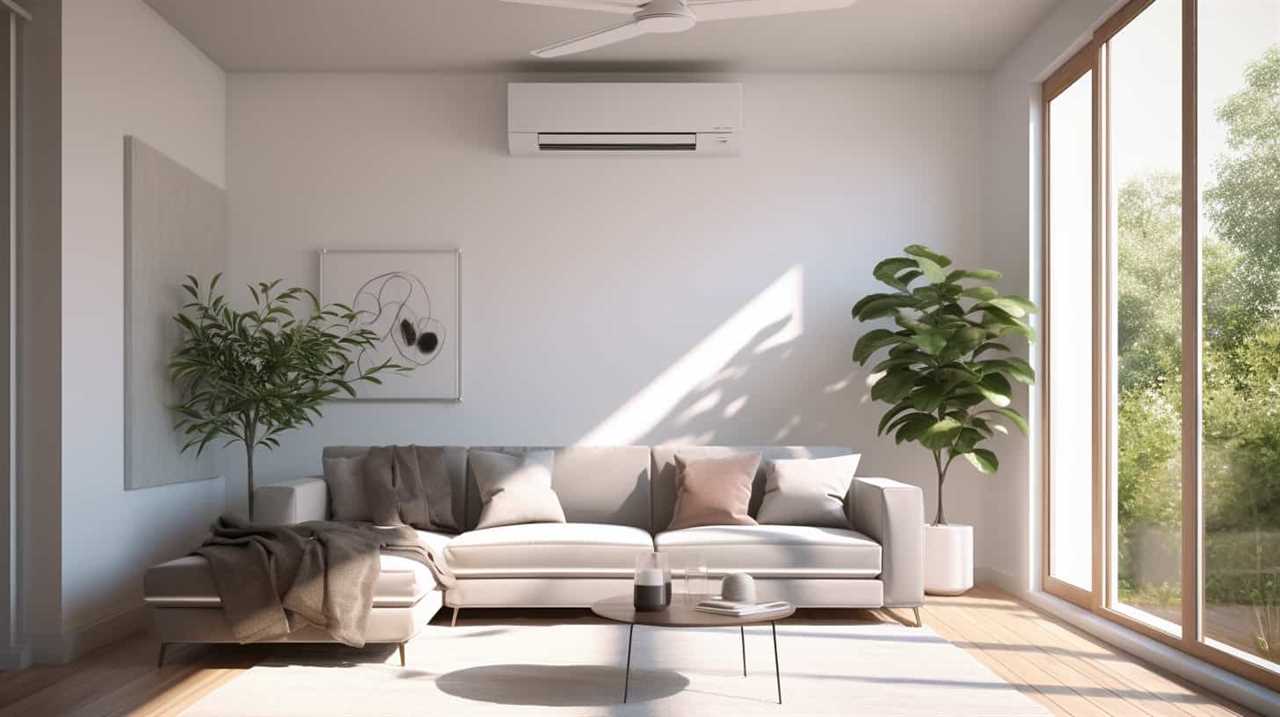
When it comes to heat pump sizing, it’s important to select a unit that matches the heating and cooling needs of our home. A heat pump that’s too small may struggle to adequately heat or cool our space, leading to discomfort and higher energy bills. On the other hand, a heat pump that’s too large may cycle on and off frequently, wasting energy and reducing its lifespan.
Additionally, heat pump capacity refers to the amount of heating or cooling output a unit can provide. It’s essential to choose a heat pump with the appropriate capacity to meet our specific requirements.
Installation and Maintenance
In order to ensure the optimal performance and longevity of our heat pump, it’s crucial that we regularly schedule professional maintenance and inspection.
Here are some factors to consider when it comes to efficient installation and regular maintenance:

-
Proper sizing: Ensuring that the heat pump is properly sized for our home is essential for efficient operation. A professional installer can help determine the right size based on factors such as insulation, square footage, and climate.
-
Quality installation: It’s important to choose a reputable and experienced installer who follows best practices for installation. This will help avoid potential issues and ensure that the heat pump operates at its highest efficiency.
-
Regular maintenance: Regular maintenance by a qualified technician is key to keeping our heat pump in optimal condition. This includes tasks such as cleaning or replacing filters, checking refrigerant levels, and inspecting electrical connections.
-
Timely repairs: If any issues arise with our heat pump, it’s important to address them promptly. Regular maintenance can help identify potential problems early on, preventing larger and more costly repairs down the line.

Installation and Maintenance Tips for Heat Pumps
When it comes to maintaining and maximizing the efficiency of heat pumps, there are a few key points to keep in mind.
First, efficient filter cleaning is essential to ensure proper airflow and prevent dust buildup.
Second, following a seasonal maintenance checklist can help identify and address any potential issues before they become major problems.
Lastly, having some DIY troubleshooting techniques up your sleeve can save you time and money by allowing you to troubleshoot and fix minor issues on your own.

Efficient Filter Cleaning
To ensure efficient filter cleaning for your heat pump, it’s important that regular maintenance is performed according to the manufacturer’s instructions. Here are some tips to help you maintain your heat pump filters effectively and cost-effectively:
-
Check the filters regularly: Inspect the filters at least once a month to determine if they need cleaning or replacement.
-
Clean or replace filters as needed: If the filters are dirty, clean them by vacuuming or washing with mild detergent and water. If they’re damaged or worn out, replace them with new ones.
-
Follow the manufacturer’s recommendations: Refer to the heat pump’s manual for specific instructions on how often to clean or replace the filters.

-
Schedule professional maintenance: Consider hiring a professional HVAC technician to perform a thorough inspection and cleaning of your heat pump system at least once a year.
Seasonal Maintenance Checklist
Our maintenance checklist ensures that we install and maintain heat pumps properly and effectively. Regular seasonal maintenance is crucial for the optimal performance and longevity of your heat pump system. Here are some important tasks to include in your checklist:
-
Efficient Filter Replacement: Clean or replace the air filters regularly to improve indoor air quality and prevent dust and debris from clogging the system. A clogged filter can reduce the efficiency of your heat pump and strain the motor.
-
Professional Maintenance Services: Schedule annual maintenance with a qualified HVAC professional. They can inspect and tune-up your heat pump, ensuring all components are in good working condition. Professional maintenance services can help identify potential issues early on and prevent costly repairs.

DIY Troubleshooting Techniques
Let’s explore some DIY troubleshooting techniques for installing and maintaining heat pumps. When diagnosing issues with your heat pump, it’s important to be aware of common problems that may arise. Here are four tips to help you troubleshoot:
-
Check the power supply: Ensure that the heat pump is receiving adequate power. Verify that the circuit breaker hasn’t tripped and that the power switch is turned on.
-
Inspect the air filters: Dirty air filters can restrict airflow and affect the performance of your heat pump. Clean or replace them regularly.
-
Examine the thermostat settings: Make sure the thermostat is set to the desired temperature and functioning properly. Adjust settings as needed.

-
Inspect the outdoor unit: Remove any debris, such as leaves or branches, from the outdoor unit. Ensure that it’s clean and unobstructed.
By following these troubleshooting techniques, you can effectively address common issues with your heat pump and ensure its optimal performance.
Now, let’s explore how heat pumps compare to traditional heating systems.
How Heat Pumps Compare to Traditional Heating Systems
We have identified three key ways in which heat pumps outperform traditional heating systems. First, heat pumps have significantly lower energy consumption compared to traditional heating systems. This is because heat pumps transfer heat from the air or ground, rather than generating it through combustion, resulting in reduced energy waste. Second, heat pumps have a lower environmental impact as they produce fewer greenhouse gas emissions. By utilizing renewable energy sources, such as air or ground heat, heat pumps contribute to a more sustainable and eco-friendly heating solution. Lastly, heat pumps offer improved efficiency and performance, providing consistent and comfortable heating throughout the year. With their advanced technology and innovative design, heat pumps are revolutionizing home heating systems, offering a greener and more efficient alternative to traditional methods.
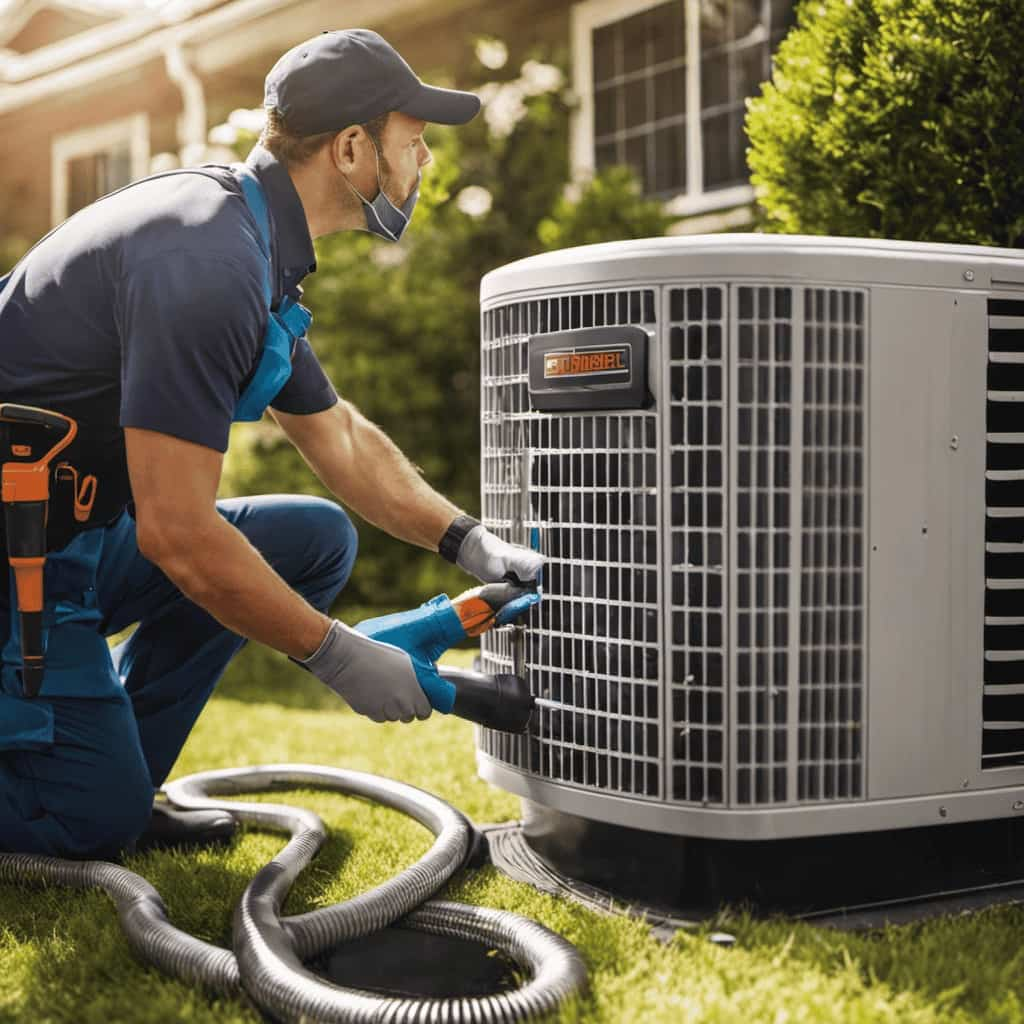
| Heat Pumps | Traditional Heating Systems |
|---|---|
| Lower energy consumption | Higher energy consumption |
| Reduced environmental impact | Increased greenhouse gas emissions |
| Improved efficiency and performance | Less efficient and inconsistent heating |
Cost and Energy Savings With Heat Pump Technology
Heat pumps offer significant cost and energy savings compared to traditional heating systems. Here are four reasons why heat pump technology is a cost-effective and environmentally friendly choice for sustainable home heating:
-
Energy Efficiency: Heat pumps are highly efficient, as they transfer heat from the air or ground to provide warmth. This means they require less energy to operate, resulting in lower utility bills.
-
Reduced Carbon Footprint: Heat pumps produce significantly fewer greenhouse gas emissions compared to fossil fuel-based heating systems. By using renewable energy sources, such as air or geothermal heat, heat pumps help reduce environmental impact.
-
Long-term Savings: Although heat pump installation costs may be higher initially, the long-term savings on energy bills outweigh the upfront investment. Over time, homeowners can recoup their expenses and enjoy ongoing cost savings.

-
Financial Incentives: Many governments and utility companies offer incentives and rebates to promote the adoption of heat pump technology. These incentives can further enhance the cost-effectiveness of heat pumps.
Transition: Now that we understand the cost effectiveness and environmental impact of heat pump technology, let’s explore some real-life examples of successful heat pump installations for sustainable home heating in our next section on case studies.
Case Studies: Successful Heat Pump Installations for Sustainable Home Heating
Frequently, homeowners have successfully installed heat pumps for sustainable home heating, achieving significant energy savings and environmental benefits. These successful case studies demonstrate the effectiveness of sustainable installation methods and provide inspiration for others looking to make a positive impact on the environment while reducing energy costs.
| Case Study | Sustainable Installation Method | Energy Savings |
|---|---|---|
| Home A | Ground source heat pump | 40% |
| Home B | Air source heat pump | 30% |
| Home C | Geothermal heat pump | 50% |
| Home D | Hybrid heat pump system | 35% |
| Home E | Water source heat pump | 45% |
In Home A, a ground source heat pump was installed, resulting in a remarkable 40% reduction in energy consumption. Home B opted for an air source heat pump, achieving a 30% energy savings. Home C utilized a geothermal heat pump, which provided a substantial 50% reduction in energy usage. Home D implemented a hybrid heat pump system, resulting in a 35% decrease in energy consumption. Lastly, Home E installed a water source heat pump, resulting in an impressive 45% reduction in energy costs.

These successful case studies highlight the versatility and effectiveness of various sustainable installation methods for heat pumps. By adopting these innovative solutions, homeowners can make a positive impact on the environment while enjoying significant energy savings.
Frequently Asked Questions
Are Heat Pumps Suitable for All Types of Homes and Climates?
Yes, heat pumps are suitable for most homes and climates. Factors affecting heat pump performance include insulation, outdoor temperature, and system size. Improving heat pump efficiency can be achieved through proper installation, maintenance, and using renewable energy sources.
What Is the Lifespan of a Heat Pump and How Often Does It Require Maintenance?
The lifespan of a heat pump can vary depending on factors such as usage and maintenance. Regular maintenance is recommended to ensure optimal performance and extend the lifespan.
Can Heat Pumps Be Used for Both Heating and Cooling Purposes?
Yes, heat pumps can be used for both heating and cooling purposes. They are highly efficient and offer numerous benefits, such as reducing energy consumption and providing year-round comfort.
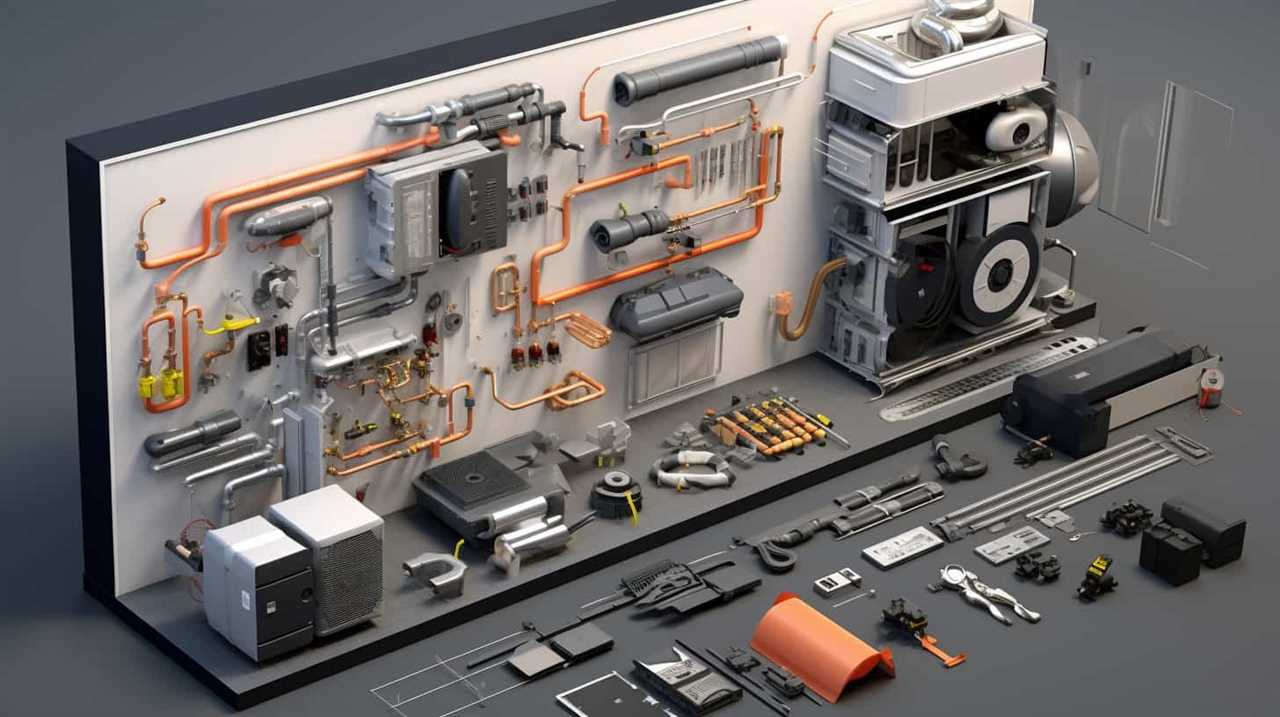
Are There Any Government Incentives or Rebates Available for Installing a Heat Pump in a Sustainable Home?
Yes, there are government incentives and rebates available for installing a heat pump in a sustainable home. These financial benefits can help offset the initial cost and make it more affordable for homeowners.
How Does the Installation Cost of a Heat Pump Compare to Other Traditional Heating Systems?
When comparing the installation costs of heat pumps and traditional heating systems, factors to consider include the energy efficiency of heat pumps and the specific needs of your home.
Conclusion
In conclusion, heat pumps are revolutionizing sustainable home heating by providing efficient and cost-effective solutions.
With various types to choose from and careful consideration of factors such as size and climate, homeowners can find the perfect heat pump for their needs.
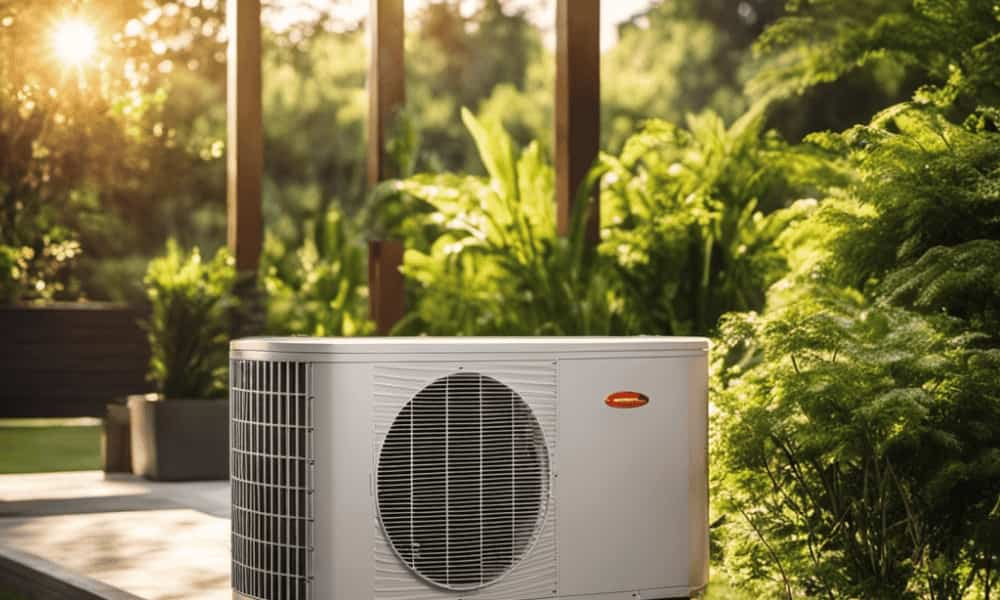
By following proper installation and maintenance tips, heat pumps can outperform traditional heating systems while reducing energy consumption and saving money.
As the saying goes, ‘Don’t put off until tomorrow what you can do today,’ investing in a heat pump is a smart and environmentally friendly choice for a comfortable home.


